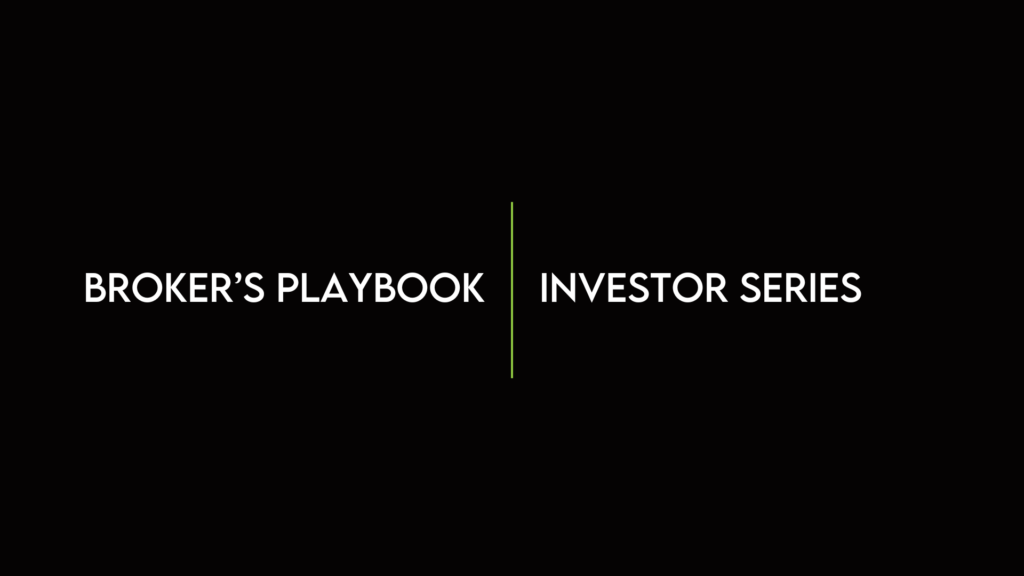
In this episode of Brokers Playbook, we have the incredible opportunity to hear the story of a true winner, Andrea Blum. With a work ethic that never ceases to amaze, our guest shares her version of the Canadian dream from the time she immigrated to Canada in her mid-twenties. Starting an entire existence from scratch was a challenge, but it didn’t stop her from achieving the success she so rightfully deserved. As we dive deep into her journey, we will not only gain insight into the mindset of a winner but also the determination of someone who refuses to take no for an answer. So sit back, relax, and join us on this amazing journey as we celebrate her successes and explore the challenges many immigrants face. Welcome, Andrew Blum, and don’t forget to like and subscribe!
Simeon Papailias: Good afternoon to my entire brokerage playbook community, to all my brothers and sisters from coast to coast. I am sitting today with Andrea Blum and I have a very interesting conversation ahead. I have known Andrea for a little bit of time, maybe the last few years. We used to share the brokerage that we’re at. She’s moved on since and she’s also accelerated her business by leaps and bounds in the same time, both here and after leaving here, it’s no surprise that work ethic in this business goes a long way. And you’re about to hear her story and her version of her Canadian dream since she immigrated to Canada in her mid-twenties and had to start an entire existence from scratch. So we’re going to be covering off a lot of the challenges and a lot of the successes that many immigrants share. But I think it’s going to give insight to everybody to understand mindset of a winner and the mindset of somebody who doesn’t take no for an answer. Stay tuned. I am sitting with the amazing Andrew Blum. Andrea, welcome to Brokers Playbook. It’s a pleasure to have you here.
Andrea Blum: Thank you for having me. Really a pleasure being here. And so thankful for for having me.
Simeon Papailias: Andrea, we’ve known each other for a minute. The last few years. You’ve made some moves. I’ve watched your journey from when you were at Royal LePage signature, which is the brokerage that I’m with and on to. You’ve made a number of moves, and you’ve really elevated your game both on social and obviously your production to a very to an excellent level. You’re a top-tier agent. And I think what what got my attention the most and why I was interested in kind of speaking further or sharing your journey is. Kind of your story of where you come from. Behind every brand, behind every business lies a journey. Yeah, you have a very interesting one. And the more I get to know it, the more I resonate with it, actually. Because you have the immigrant story, of course I have an immigrant story, as many of our audience already knows, but I think yours is different. I came here at 16. You came here at 26. In those ten years are very, very formative. I was able to assimilate to Canadian culture before I had much. To pay for. Meaning I had the advantage of high school. Of understanding the dynamics of how different they are. And the there’s a huge difference between Europe and North America, no doubt. Huge. But there is also just a way of life that you need to know how the buses work and where you buy your tickets and just everything. Like people have a tough time understanding that level. But when language is still a problem, it’s exasperated because you can’t communicate as effective as someone else. Take me from scratch. You came here for 26 years old. What were your circumstances? Kind of. Where was your mind at?
Andrea Blum: Well, I’m. I’m happy You. You want to go with that? That route? I think we’re 80,000 agents in the Toronto board. And if you think about it and you look at it and you kind of study, it would be quite. Quite a number of them being immigrants either first time immigrants like myself or second hand immigrants like yourself, but still immigrants that that to a certain extent, they’re facing the same kind of struggles that I’ve been I’ve been battling over the years. And I like the fact that you wanted to go back to the roots, like understanding and what’s behind it. And I think it’s worth it to look at the background of where I came from. So I’m Romanian. I mean, you’re Greek in terms of culture. They’re very, very similar, very similar. However, Romania actually was under communist regime for 40 years, and it just happened that the last ten years, if I’m not mistaken. Correct. So the last ten years of this regime were my first years in life and the last ten were the worst. And like it or not, these are forming years where although I’ve been very sheltered by my parents, I can’t even imagine being parents with two young kids raising them in that kind of environment. But I’ve been exposed and influenced to the lack of food, the lack of heat in the house, the fear and all of these things that that created that illusion and that that that desire of the American dream. So I grew up with that. You know, in my DNA that I needed to find a way. And then the revolution came. And obviously we thought that the Americans will come and save us. That never happened. So then I start thinking, well, how about if I go to the Americans? Canadians were not in my in my vocabulary at that time, I think.
Simeon Papailias: But it’s kind of all one in the same. Nobody in Europe looks at Canada or America different. It’s all one and the same. Yeah, it’s.
Andrea Blum: Kind of the West. You just want to make it there. And you know, one thing that I can tell you to all immigrants and you have this this expectation of the American dream and then you think that the hardest part of this American dream is actually waiting in your country while you’ve been accepted by the other country where you want to go. And then you come here.
Simeon Papailias: And you realize that was nothing that was so comfortable.
Andrea Blum: That, you know, not only that you have to come through that very hard realization that emotionally and mentally you have to deal with. You’re not at home.
Simeon Papailias: Yeah, you’re detached from everything you’ve ever known.
Andrea Blum: You don’t have your family. I came here without a family. You don’t have anything that you know. You grow your roots. There’s no feeling of belonging. But on top of that, you have to understand a new way of living, which puts you in a position of not being here or there. You’re never home here or there, and you just learn to live with it.
Simeon Papailias: Well, you just made my the hair on my arm stand up because it’s true. It’s very difficult for somebody to ever understand what that entails. You’re no longer Romanian or viewed as a true Romanian because you’re not in Romania, and here you just don’t quite belong. And and it’s so interesting. But I wanted to say just before we get into that, I remember being I lived in Greece when Romanian Revolution happened, and it was actually so the execution of, of the the dictator in Romania of Ceausescu and his wife Helen was her name.
Andrea Blum: What was it? I can’t remember. It doesn’t.
Simeon Papailias: Matter. Ellen. Ellen. Yes. So so I remember it like yesterday. I must have been ten. It was right around the same time as the East Berlin collapse. Like those. Those years.
Andrea Blum: We’re the same age. Yeah.
Simeon Papailias: So with that said, I remember televised event. So I come from a communist family in Greece where after the Civil War, Communist still exist. But they were prosecuted, exiled and ultimately lost. And that’s why Greece is where it is at today. But at the end of the day, my family is enveloped or characterized as a communist family in Greece. So not only was this televised, my entire family was watching this live event in us. Kids were invited to watch the execution of Nicolae Ceausescu. So it’s it’s the mindset of of and cultural differences of how politically charged people are. Like you come here it’s easy to make fun of North American culture where nobody cares about anything. Like it’s just things are happening. You’re like, if this was in Greece, people would be blood on the streets. On the streets. Exactly. But here it just doesn’t happen that way. And the reason for that and I think and I’m going to tie this to success in business, if you understand that here, everybody has the agenda of making it. It’s a country of immigrants. Every single person that we encounter every day, whether they’re first, second, third or fourth generation, nobody’s from here save and except the native population, the indigenous Canadians that were here before, which I’m not even going to go into how they’re treated. They’re treated like immigrants in other countries. But anyways, I don’t want to touch that because that’s a huge thing to unpack. But here, the reason it’s so easy not to care about anything is because we care only about one thing forward progress. Yeah. How do we put what we had behind us? Behind us? And move forward in creating a new legacy, something that’s functioning. With that said, you move here and you realize who you truly are and you’re a person that’s a decade behind minimum.
Andrea Blum: Yeah, well, I was under the ocean level. Put it this way. It was a shock. It was a shock to come here and realize that I’m not even I wasn’t expecting to, to, you know, to start fairly. But I was definitely way below the sea level. And that’s that’s pretty painful, especially when you come with a kid. You have a responsibility. It’s not as simple. It’s not just your skin in the game. So there’s a lot of stress that puts you in a position to either collapse or to either figure out a way and you’re not going no matter what.
Simeon Papailias: And what did you do?
Andrea Blum: It was tough. It was tough between, you know, accustomed with the language. I think that was one of the things that that I struggled with. But also it became later on, one of my biggest advantages in real estate, because not knowing the language put me in a position of I don’t know what I’m supposed to be saying to these people, but I should develop a way of talking with people because I don’t know. I don’t know even the words. It was a struggle to take the exams because I didn’t know eavestroughs what they meant. You know, you have to go to Google every single word. So that was a struggle. I also I suffer of dyslexia and and that was a struggle in itself. So it’s not it’s not a complaint, I think, or a cry for for pity or anything like that. I think it’s more about unveiling that the whole, um, image of success that a lot of agents are seeing right now and all the social media platforms is it comes at a lot of cost and it comes with a lot of struggles and a lot of agents are at that level right now. And I can confidently say that that there is a way to come out of it as long as you have that attitude, which to me, I describe it, I don’t know if I’m allowed to say it, but I describe it as like, I’m not going anywhere. That’s right.
Simeon Papailias: You’re definitely allowed to say it. Yeah. And it appears you didn’t fucking go anywhere. I didn’t.
Andrea Blum: Go anywhere.
Simeon Papailias: Yeah. So how did you get business? So I think one of the big, big parts. The biggest with 83. You said something earlier. 80,000 agents are on the Toronto Real Estate Board. 100,000 agents in Ontario. I think it’s very noteworthy and a lot of people have now mentioned it. Over half of them didn’t do a single deal last year. Yeah. The other stat that I know to be true and I teach a course on brokers playbook, the online platform on on how to succeed as an agent, how to become a successful agent. And that’s follow up. And we’re going to talk about follow up because you’re a follow up monster because that’s your success and that should be everyone’s success. But if you if you’re just starting out. You saw your best friend driving a Ferrari. He’s in real estate and you think it’s going to be easy and everybody thinks it’s easy and that’s okay. Everybody will come to their own realization soon enough that it’s not. And it and it is not. And unfortunately, a lot of people struggle and lose a time that they’ll never get back and money that they’ll never get back. You came here, you know, nobody and you had to build a sphere. What steps did you take? Because work ethic in this business is something that’s completely overlooked. The amount of actual work that you need to do. Of how many seeds you need to set for one to actually bloom. Yeah. Tell me a little bit about what you did to get off the ground.
Andrea Blum: I realized very quickly that I need to talk with people. People won’t come to me. I don’t know anyone. So obviously I realized it’s a service industry, which means I need to serve somebody. And I didn’t know anybody and I definitely didn’t have the time to go and socialize with people. I had a kid at home and I had to have a full time job as a salesperson in the mall or clothing store so I can pay, pay the rent and pay the $4 an hour a babysitter with with my daughter. So there was no way that I would have had the time to socialize or wait for that to happen. So it was clear to me that I had to find a way to go where the business is. And I understood quite early that what am I selling, what’s the product that I’m selling and I need to service and who holds that? And I realized there’s the the homeowners. So I had to go where the product was at the door. I started door knocking in my days off and and I start going at the door and just develop a set of questions to ask people to allow me a conversation. It was super, super important for me to be consistent, to keep coming back to these people.
Andrea Blum: The same people that say no, as I realized that 99 .9. 9%, they don’t need that service yet. But because I’m an analytical, I realize that in Canada people are moving anywhere between 5 to 7 years. So I calculate myself, everybody should sell within the next seven years. So I need to be in touch with them for the next seven years. And then I would have a certain amount of business no matter what. So that’s what I did. The second I actually started door knocking, I took 14 listings in my first year and I was at RILA Page Signature and everybody was kind of like, How how did you do it? And I was a new agent and I just door knocked and just talked to people. Um, it’s. It’s not as popular as it, you know, right now. But in a market like this that we’re going through right now, where the inventory is so low, it’s so imperative to go for the must clients that they need to do something. And in my experience, a buyer does not need to do something 90% of the time. A must client is a seller, of course, and the product is there on the streets. So why would I be anywhere else than where the product is?
Simeon Papailias: So so I think just to unpack that a bit further, a must client is somebody. So what we saw in the last year, now we’re seeing some actual movement. And to just to timestamp it, we’re sitting in in beginning to mid-April right now of 2023 and we’re now seeing some movement only because of the pseudo confidence the Bank of Canada put into the market, saying we’re not going to lift interest rates anymore. Bonds, by coincidence, went up, which means the rates came down. More people are putting money into bonds because of the uncertainty of the markets and fixed came down. So we’re seeing some activity which is now natural activity. But for the last year when fear mongering was the only thing happening in the market, there was still 50% of the market moving. So at the peak we had, let’s call it 100,000 transactions, we got cut by 50%. So that tells us that half the sellers at all times have to move. They don’t have an option. Yeah, because anybody who sold in August or October of last year did not want to sell in August or October of last year. They knew that six months ago I would have got 100,000 or 200,000 more. Yeah. So these people had to move. The people representing those people 90% of the time are the same legends of real estate that you see lining every sign in your favorite neighborhood, the well known names. But there’s always some names that you don’t know. How did they get the business?
Andrea Blum: Well, the usually I farm. So from time to time you see actually people that they’re not from the neighborhood, and that’s the people that nurture their sphere of influence. That’s right. So there’s no question about it that if you do have that sphere of influence, which I didn’t at the time, then they’re going to pay you back a certain amount. As a coach myself, I can tell you that one of the most underrated tactic of getting business by agent is by not nurturing their sphere of influence, which for someone like me, I find it that’s gold. So I would have given anything to have a sphere of influence. So yes, if you have a sphere of influence, you will have a little bit of a easier time last year, but on the same time, my my advisors always if your sphere of influence represents 100% of your business, you don’t actually have a business. You’re definitely not growing. Most likely what I’ve seen when coaching agents that they’re in their late 50 seconds is that their sphere of influence is set. They have their own property, they have a couple of investments. If and the kids are not yet at the point financially stable to recommend, you know, the parents to recommend you to the kids so you’re not doing much. So then you’re going to become busy in your 70 seconds and 80 seconds if you’re still alive because of obviously everybody’s going to downsize and so on. So it’s not my cup of tea to just rely on your sphere of influence, but if you’re lucky you have it. I call it double soar with the sphere of influence. When I see agents that they’re super lucky in their first year, they get, you know, ten transactions from their sphere of influence. I said, Oh my God, look at this one. This one is going to be for three years in the business before they go out because they don’t develop. Absolutely no.
Simeon Papailias: And they’re going to starve and they’re going to starve. So the minute those ten deals are done, there is no more deals. There’s no systems, there’s no process. Yeah. And there’s no gratefulness. Either you felt you deserved those deals. Absolutely. So there’s that. There is that. So let’s I think we need to talk a little bit about that. So again, I definitely think that there is a big component of our of our colleagues that face the same challenges we did. You even more so because I didn’t have a language barrier. By the time I got into real estate, I had kind of moved past that obstacle, which is a big, big one. But in sales I was able to see success very early. And the reason for that is because I always leveraged the things that I’m best at. I’m a commercial broker by trade. I never did residential at the highest level. By the time I dabbled more into residential, I was already a team lead and running a bigger ship. But coming from the restaurant industry, classic Greek immigrant story straight into restaurants. No, absolutely nothing wrong with it. It’s still surviving today in the hands of my. Little brother. But I went after commercial listings very quickly and saw big success with those. Learned how to market real estate in this city. How? Because every market is different. People think real estate is real estate.
Simeon Papailias: It’s not. No. Every city has its own nuances. Every market, every asset class has its strong players, its weak players and all the fluff in between. But I pride myself on on relationship building, being able to relate to somebody very quickly, find what we have in common and take that to the next level, because I care far more about what we have in common than what makes us different. Yeah, focusing on what makes us different is only a tearing down technique, not a building up technique. When people say together we are stronger, together, we are better, all these things, it’s because you build on what you have in common for two to get somewhere else. So building a team for me, building a client base that’s unique for me is natural. I have at least. A half a dozen major verticals in our business development plan. I run a team with 60 agents at this point. It’s a big ship. Lots of mouths to feed. What I mean to feed is the reason people come on. My team is to grow their business, so I have to be a part of that solution. How many verticals do you have in your business today? And I mean residential real estate, pre-construction network and event marketing? What is it you leverage most? How many verticals do you have feeding your business in your sphere?
Andrea Blum: It’s a great question and definitely you by hearing you, you leverage way more sheep than I do. Um, I, I don’t have that many. And I transition from one to the other and kind of, you know, I, I allocate a certain amount of time that’s transitioning right now. I would say I probably I’m in a transition phase. Until three years ago, I was fully just in residential doing some commercial just by nature of clientele rather than me seeking for that. I do believe that it’s so different than than residential that it wasn’t my expertise and I preferred all the time to refer unless it’s something like really common sense that it would be easy for me to serve the client. Three years ago, I went through the transition phase of Where do I go from here? I’m starting a team. Should I buy a franchise? Should I open an independent brokerage? That was a huge, huge thing for me. In 2019, I actually even went into an agreement to purchase a franchise, a royal, a franchise. I ended up not doing that in the end. And then I realized, wow, opening actually my own brokerage wouldn’t allow me to do what I like best, which is one, serve clients to train and be a coach more than anything else. Um, the second I came to a certain status and financial independence, it was really important to me to go from that need of certainty in life into my need of contribution. Which was the one that I was looking for in the beginning, but I couldn’t do it without the certainty to begin with. So I discover that I can do that through coaching. I can do that through mentoring. I can do that through building a team. And you’re talking.
Simeon Papailias: About fulfillment for yourself?
Andrea Blum: Correct? Yes. Again, goes back to my core values. You know, I grew up in an environment where if you wanted to have that extra piece of bread because we have ratios for milk, for sugar, for everything, you had to know how to be a team player. You had to know how to play with the kids outside. I always go back to the fact that growing up in the Romanian community at the time, it taught me so many sales skills.
Simeon Papailias: Negotiation, my friend. Exactly. If you got to negotiate for an extra piece of bread and that means a quarter of your sugar and half of your cheese. Exactly.
Andrea Blum: It is what it is going, you know, in the summer. It’s funny because in the summer we would have the people from the countryside come in and sell all of these all of these beautiful things, you know, the fruits and vegetables and and I wanted it for free, obviously. So you had to learn to make people like you fast so they can give you that piece of fruit and you’re like, over the moon to, to, to taste that. So that put there were two options for me either to go, hey, I’m out of here and I’m going to make it, which will be me, me, me, me. Because I need to save myself to be into that kind of like protective mode or I’m going to make it and I’m going to drag quite a number of people and we’re going to make it. So I’m I consider myself pretty lucky that I feed on community and I feed on, hey, who am I going to help next? In the real sense that hey does not necessarily comes at my advantage. My advantage will come later. It’s always going to happen.
Simeon Papailias: So. So you finally understood that? I don’t think it’s a matter of luck. It comes to people at different points of their lives. The moment that your agenda becomes everyone else’s agenda is the day you broke through. Yeah. So when you help everybody, everybody else win, it’s actually impossible to fail. You fail because there’s too many people that are sitting waiting to catch you. Yeah. So that’s creating reciprocity by helping others, by giving your time to others. And people unfortunately, live their entire lives and never get that. And when people say, Oh, that person was just really into themselves and it was just about them, there is no worse legacy. Yeah. None. Yeah. Than being that person. When you hear somebody say that person is selfless, that person gave me their time. That person changed my life. That person? Yeah. You’ve already won. Yeah.
Andrea Blum: It I call it lucky because I think I’m lucky to be self-aware of that. I’m true enough. Yeah, true enough. I’m lucky because you won’t even.
Simeon Papailias: Give yourself that credit.
Andrea Blum: Good for you. That’s so humble. Yeah. You have to have a certain amount of understanding yourself to even consider it. And I go through life meeting so many people, and some of them sincerely they can’t understand the concepts. So you can’t even blame them because they don’t have they don’t have what it takes to see it. So it’s impossible for them to apply it.
Simeon Papailias: How does one how can you help somebody find the gift of giving or appreciating that there that we’re better together? Like you can never possibly accomplish more on your own than you can with the help of others. That’s a fact. Anything, anywhere to people is stronger than one. That’s it. So how can we help somebody come to that realization? Or what do they need to do to break through to use that in collaboration in business?
Andrea Blum: That’s a tough one.
Simeon Papailias: Can you show that? Can you teach that.
Andrea Blum: To To me, it was very easy because, you know, when you have nothing and you and then you have a lot, you know, being part of the 1% in Canada financially and you realize, hey, I’m not happier, I’m not I was as happy. And if I were to lose everything today, everything financially, it won’t make a difference for me. You don’t get that unless you’ve been through some shit, you know?
Simeon Papailias: So I’ll tell you, I haven’t heard many other people in my life say that. I’ve had this conversation with my business partner who comes from this background. I’ve had this conversation with my wife, which is for her. It’s wide open and awakening moment. Yeah, because she her dad came here as a kid. She was she was born and raised here. And they her father we’re talking extreme immigrant mentality. Hold on to every penny we make because they came from nothing. He grew up on dirt floors, no food, animals waking up beside him in the stable because that’s where he lived. Facts. Yeah. So hold on to everything. Hold, hold, hold, hold, hold. Share with nobody. Not that it’s anything wrong with it. Yeah, but that’s his existence. Yes. Yeah. It’s not a nice. It’s not a nice existence. Yeah, it’s not nice to break through. That is huge. But you said one thing. To morrow morning, something happens. And the thing is, something can happen to morrow. Of course, just like pandemic happened, just like, of course, people in Ukraine didn’t wake up one morning thinking that nothing would ever happen. They knew that one day it was a matter of time. Of course there’s going to be a tank rolling in front of my house. Yeah, it can happen anywhere. Don’t kid yourselves. But some people are prepared for it mentally. You can take everything away from me today. I’m not worried because I’ll rebuild it. Because I don’t give a shit. I’m not scared of working. Yeah. Yeah, That is the biggest thing. So how do you possibly without living it, how do you try to instill that? What do you tell your kid? Let me start there.
Andrea Blum: I think I think my kid had her moments recently where she started to appreciate the way she grew up because on one hand, she grew up with everything. On the other hand, she was not giving anything like everything that she had she needed to work for. She was coming to me and said, Mom, I have the richest family in school and I’m the one that I need to work for everything. All the other kids are getting this and are getting that, and you’re making me work for everything. So my daughter does not get a pass on on anything and and you just go to the core values and you start to understand that you can hand to your kids opportunities but not free passes. And if they’re starting to see opportunities, they’re going to be focused later on not only in you but around them to spot opportunities and not pass them rather than waiting for something for them to happen or to be handed to. And and she’s 21 now, so she’s starting to to take advantage of all the lessons that over the years seemed to be too much for her, too too much treated as an adult and not treated as she should have everything she wants at all times just because we have it and we can afford it.
Simeon Papailias: So I definitely see the correlation. I’m trying the hardest I can. My kids are seven and ten, but already it’s so difficult for them to clear the lines between having everything because unless we have everything and trying to put it back to a perspective where they can become reasonable human beings and not spoiled brats is a very, very difficult. It’s very hard because what they appreciate and what they actually want versus what they don’t want. For a ten year old to not want to be told what to do. I’m so sorry. I’m so sorry. It’s exactly what needs to happen. He was told exactly what you need to do. Yeah, but this exact discipline is again, I’m not bringing this up on a business podcast for nothing. You were not able to answer the same question when I asked you about your colleagues, but when asked you tell me what you’re telling your kid, all of a sudden you had everything to say. Yeah. So I think it’s a matter of this is just proof of asking the right question to anyone can unlock everything versus if I were to take four more different takes to try to bring you that lesson of how to make somebody else feel what you felt that are not living it.
Simeon Papailias: She didn’t grow up in Romania. No. She didn’t have to beg for a piece of peach. No, you did. So how do you make somebody who has not lived that appreciate the world as much as you do? Because everybody like that same peach, for example, anybody else might look at it. I don’t feel like a peach throwing the garbage. I will smell it first. Is it at least really ripe before I toss it? Am I making am I throwing away an opportunity? Yeah. Where I can’t just throw it out? I can’t just say no because it may not come. Yeah. May not be there. So I think we’ve unpacked this enough. I want you to give me your three top pieces of advice. Actionable. Right now, it’s April. It’s April 20th, 23. Follow up. Is your name of the game? Tell me a perfect strategy, a follow up. How many times do I call somebody? How often do I check in? What do I say?
Andrea Blum: I follow up until they list with me. If you have an interest to sell, there’s 99% chances that you’re going to sell with me.
Simeon Papailias: And how do you nurture? So let’s say I’m not ready to sell now, and you know that I’m not ready to sell. How are you going to nurture me for the next two, three years?
Andrea Blum: There’s there’s an element of mechanic there and the boredom repetition that agents don’t really get where, Larry you have a CRM and you keep dating them, but also a level of interest because the follow up in the CRM might be at the particular date. But if you’re actually interested in that person and their needs and wants, as you’re going through real estate market, there’s certain information that may be good for them at a time that is not your follow up time. So if you’re creating that type of of true care for that lead, that is not just the lead in a numbers game, then they’re going to pop in your mind when.
Simeon Papailias: You’re investing in the relationship.
Andrea Blum: Yes. Yeah, it is. It is a relationship building. I think it’s two there’s two phases of it. I have my clients, which I’m the one most interested in a short term to be around with, which are the must want now kind of clients that need a different level of attention. And then you have the ones of nurturing in the long term, not so much interested in the long term ones as I am in the must now ones, but the other ones are still getting a certain level of attention. Follow up is is critical all the time. Like a maniac. I’m literally a follow up maniac is as simple as that.
Simeon Papailias: This is why you’re successful. I did in my class this morning, I mentioned that 90% of agents will not get to call number three. No. And that’s what makes it so easy to succeed in this business. The fact that you can you can actually statistically rely on others. People laziness in their incompetence is what makes this game so easy to win.
Andrea Blum: It is actually, you know, real estate is the easiest industry. It’s harder to to implement it. The number one reasons people don’t follow up is because they they didn’t have a success on the first call. And it’s almost expected. But it brings me to the second thing, because you said, what are the three things to success? And the first one that I always say that’s that’s number one in sales is to understand that you’re in sales, you’re in service, which means you have to put your ego on the side. I had clients, aunts, that told me literally in my face at the door, go fuck yourself, Larry, in this world. And then a year later sold with me. So if I would have put my ego, which is ego from different perspective, you know, I want to protect myself or I’m being hurt or I’m not banging you for business, whatever it is, take precedent then to what I need to do, which is serve this community and serve this farming area, whatever it is. I would have never went back to that door and all I thought it was he had a bad day. These people can get really bad news just like anyone else. Anyone else. They don’t need your service today. But even more so, going back and still providing value to someone.
Simeon Papailias: You displayed that you could rise above something like that. It’s more than likely you got that business because that person felt like such a dick that somebody they told they spoke to like that came back to the door above and beyond. She should never be here again. But here she is. I bet you that that had a lot to do with you getting that business, because unless that person is a sociopath, he was wrong. You were wrong.
Andrea Blum: I think there’s a certain element of compassion that I have towards people. If somebody is in such a head frame state, there are certain people that they’re just assholes, poor assholes like. But the reality is 90% of people are. They’re not in the right place if you catch them at that time. And even more so, you know what? They weren’t looking for me. I disturbed them from something that it was way more important or disturbing to them. So I look from a perspective of compassion towards people rather than being offended and think of them, Wow, I hope it’s not cancer. I hope it’s not death. I hope it’s not something bad that makes people, you know, be in a position to say that to someone who’s someone that they can see in the community. Obviously, they know me. So. So it’s it’s more than just thinking about myself, Hey, I’m being hurt. No, these people don’t know me.
Simeon Papailias: You’ve dropped a lot of gold. And I’m going to go back to the gross statistic that 90% of our brothers and sisters will not get the call. Number three. No, it really bothers me. I have a very large team. I’m at a large office of 1500 agents, which means that over a thousand agents from this office, maybe not this office because it’s a very premier office, but let’s call it close to a thousand agents at this office as well. We’ll not get to call three. Yeah, My piece of advice and I’m going to bring this, this, this podcast to to to a close here, my strong advice is that if you want to compete against Andrea, who’s a practicing broker, you want to compete against me. You want to compete against the person sitting next to you at the office right now? You have to take your business seriously. You have to invest in technology that can help you do some of the heavy lifting. The money is all in the follow up. Oh, yeah, 1,000,000%. You can hear all the podcasts about new ways to get leads. You can hear all the advice and we give this advice all the time. But unless you understand and appreciate what you existing have, what you have existing in your database, if you were to open your phone and there’s 400 contacts, a thousand contacts, some of your very popular, what was the last time you called them and reminded everyone that you’re in real estate? If you were to make that one simple phone call right now, go through your phone. Say, my name is Simeon. I know I haven’t spoken to you in a year, but I’m in real estate now. If you need anything, please just give me a call. If you just did that, you would bang out 5 to 10 deals a year.
Andrea Blum: Absolutely.
Simeon Papailias: Yeah. Andrea Blum, I want to thank you so very much for sharing your time, your story and your insight with every single one of us. I personally really enjoy today’s episode because you brought me back to a lot of feelings that I haven’t felt in a long time. So for having me and I and I hope a lot of our audience got a lot of that too, because I know there’s so many, maybe not so many Europeans now. There has been a few Europeans coming, but all of those who feel the exact same way when you came from wherever you came from, we’re all chasing the same thing and we’re all trying to do better and good by us, by our families and by our communities. So I hope this episode brought a lot of insight and I hope you were able to resonate. Please get us feedback whenever you can. Until next time, Andrea, thank you for being here.
Andrea Blum: Thank you for having me. Take care.
Bobby Puim: Thank you for tuning in to this episode of the Broker’s Playbook podcast. For more of our content or for help levelling up your business, check us out at Broker’s playbook.com on YouTube or wherever you listen to your favorite podcasts.








